
 Administration for Children's Services311
Administration for Children's Services311 Search all NYC.gov websites
Search all NYC.gov websites
Hacker Presentations
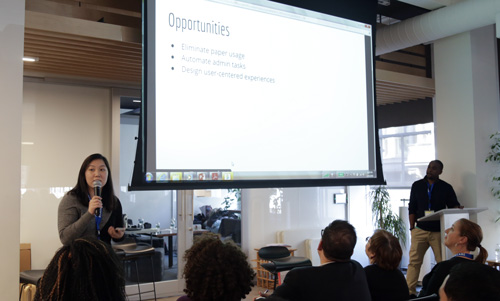
Learn more about each of the technology and policy “hacks” or project proposals that our tech and youth policy hackers developed in 24 hours to #HackNYCFosterCare.
Check out the Tech Hacker Presentations
Check out Youth Policy Hacker Presentation
Return to #HackNYCFosterCare page
- AUDIENCE WINNER: LaunchPad
Hackers: Justin Cohler & Jess Dale
Description: This web application is a platform that allows young adults and their caseworkers to plan goals for independence, track progress, and aggregate important documents. - Iris
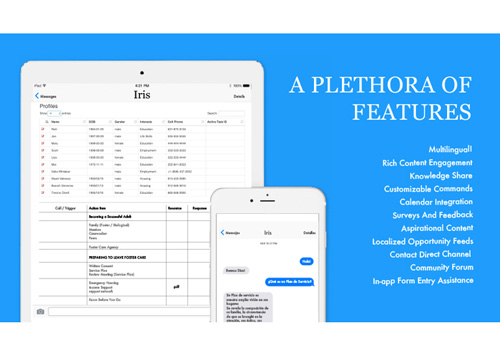
Hackers: Richard von Rauchhaupt, Brandon Nygard, Scott Rigby, Annie Stone, and Mai Irie
Description: A text-based program to deliver resources for youth from social services in order to achieve key milestones and feel empowered to take action as a decision maker in planning their future.
- Portal Case Management App
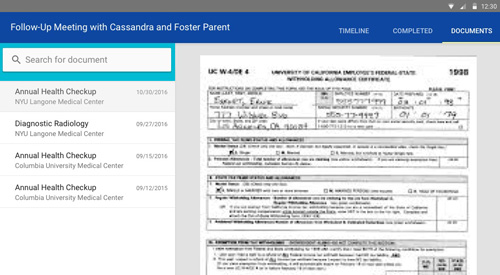
Hacker: Sylvia Lee
Description: An app that streamlines tasks for caseworkers and social workers to increase productivity and efficiency; view meetings and other interactions; assess foster children’s goals, programs and progress; share documents with foster parents and children.
- Paired Parenting
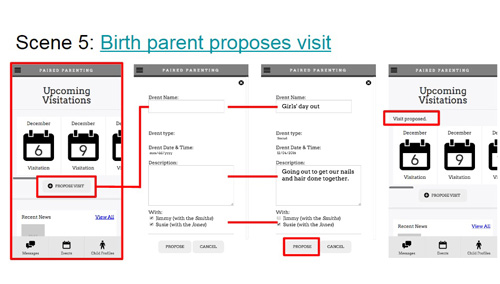
Hackers: Andrea Wilhelm, Mike Gerrudes, and Mitch Saltykov
Description: Paired Parenting is an app connects biological parents directly to foster parents in a secure, permission-based manner that allows each biological parent to communicate with the foster families, set up events that encourage bonding and parent-skill building, and build their child's "profile" (routines, hobbies, etc) together.
- Aging Out NYC
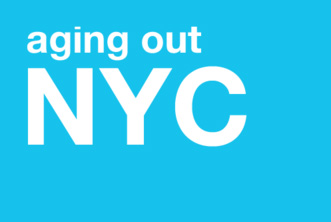
Hacker: Ryan Villaneuva
Description: Transitioning out of foster care is a difficult and confusing process. To make it harder, there isn’t any one central place to find all the information you need. We’ve put together a list of resources recommended by youth who are or have recently been in the foster care system.
Visit Aging Out NYC Website
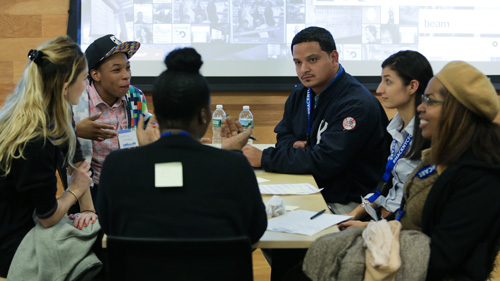
Youth Policy Hacker Presentations
- Connecting to After-Hours Help
Policy Challenge: Many times, youth and foster families face crises at times outside of traditional work days/times. Despite a need for after‐hours accessibility to support services, currently, what is available is quite limited.Policy Hack: Youth developed a concept for a “We Got You” mobile app as a 24/7 crisis to a number of issues regarding unsafe placements, basic needs not being met by foster parent, youth being locked out of foster homes, etc. This app could serve multiple functions that connect the youth to a support network, emergency funds, transportation, alarm notifications, mentors, family and friends.
-
Incorporating Youth Voice
Policy Challenge: Although youth voice has become a significant consideration in child welfare/foster care work, there are still too many occasions when young people are encouraged to rely on (adult) advocates to guide them through their own case processes. Youth need to be empowered to advocate for themselves and their peers, and provided regular opportunities to do so.
Policy Hack: Youth suggested pre-court time to connect to the judge on their own behalf and also created a progress update form so that youth can formally voice their personal concerns and have them included in the court record. They also suggested that professional peer advocates be hired by the court system to advocate for youth. These advocates should be foster care alumni who can also facilitate workshops for foster parents and staff in collaboration with youth.
-
Empowering Youth for Successful Adulthood
Policy Challenge: The foster care system is not always developmentally responsive to the strengths, needs and abilities of youth, particularly as they grow closer to the age of transition out of care. As a result, teens often experience less than normative adolescent experiences. In preparation for successful adulthood, young people in foster care need to experience graduated levels of responsibility in their own decision‐making processes.
Policy Hack: Youth worked directly with a hacker team and developed a prototype to track and monitor appropriate developmental milestones and achievements. Examples of this would be obtaining all legal documents (Birth certificates, social security card, working papers, driver’s permit & license, passport). Youth recommended that agency providers maintain regular contact with youth throughout their time in care; and that a consistent curriculum designed to prepare youth for the successful transition to adulthood be developed and implemented across contracted agencies.
-
Broadening Opportunities for Youth
Policy Challenge: As foster youth transition out of care due to age, they are often encouraged to rely on public assistance and housing; youth need to be focused on wellness milestones, and system stakeholders need to be supportive of those achievements. A broader range of options re: education, employment, and housing (amongst other areas of development) need to be made available to youth in care across contracted provider agencies.
Policy Hack: Young adults proposed the creation of an awareness campaign promoting alternate housing opportunities for youth in care other than NYCHA and existing NY/NY3 supportive housing programs. They recommended pursuing public/private partnerships with realtors to reserve a portion of dedicated low-income housing units for youth transitioning from foster care. Additionally, it was suggested that a mobile application which consolidates information allowing youth to be informed of new housing opportunities (as well as educational and employment offerings) be created; developing curriculum and providing youth with workshops on financial literacy and empowerment programs was also suggested.
-
Healing Trauma & Fostering Healthy Development
Policy Challenge: Young people enter into foster care most often as a result of child abuse or neglect, and the impact of those experiences can have lasting impact throughout their growth and development. Many foster youth need consistent, quality therapeutic services through their late teenage years but struggle with accessing nontraditional services (i.e. support groups, creative arts therapy) that are based on their own strengths, abilities and interests.
Policy Hack: Young people suggested collaborate with an existing organization (based in California),One Degree, to help youth conveniently access community-based physical and mental health resources while still in foster care (and transitioning out of care) via an app that currently links young people to various support services.
-
Finding a Good Fit: Recruiting Foster Parents of Diverse Backgrounds
Policy Challenge: Many older foster youth have struggled with “finding a good fit” with foster families; a large diverse pool of adult caregivers needs to be developed as potential foster parents for this population so that there are options available and a quality matching process can occur.
Policy Hack: Youth created a sample public awareness campaign, "We Want You," designed to recruit foster parents of diverse backgrounds and lifestyles utilizing social media and other non-traditional outlets.
Watch the PSA Video developed for the “We Want You” Campaign
-
Adoption4Life: Sustaining Adoptions
Policy Challenge: Adoption is considered to be an ideal permanency option, but in too many cases it has actually proven to be more temporary. “Broken” adoptions can have a significant negative impact on youth.
Activity: Provide families who adopt with the tools and necessary supports to sustain permanency. Such activities include tailoring contract agreements to include voice, conducting monthly home evaluations and developing an adoption crisis telephone support line.
In addition, a young mom (whose 4 month old daughter was on-site throughout the event) also took on the issue of funding quality childcare for teen parents so that they can continue their education and pursue employment while still in foster care themselves.


